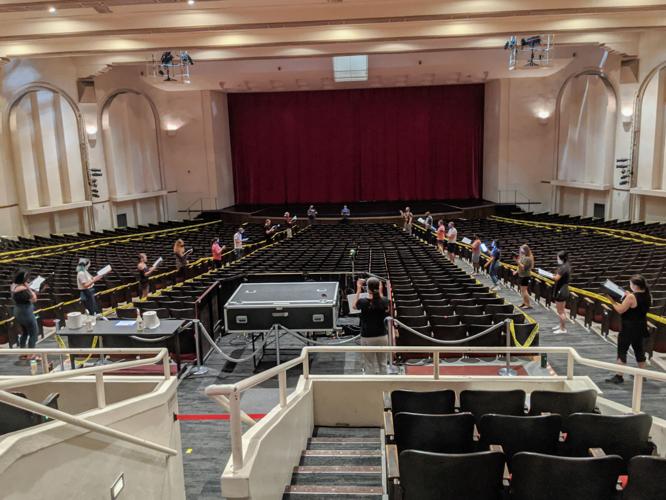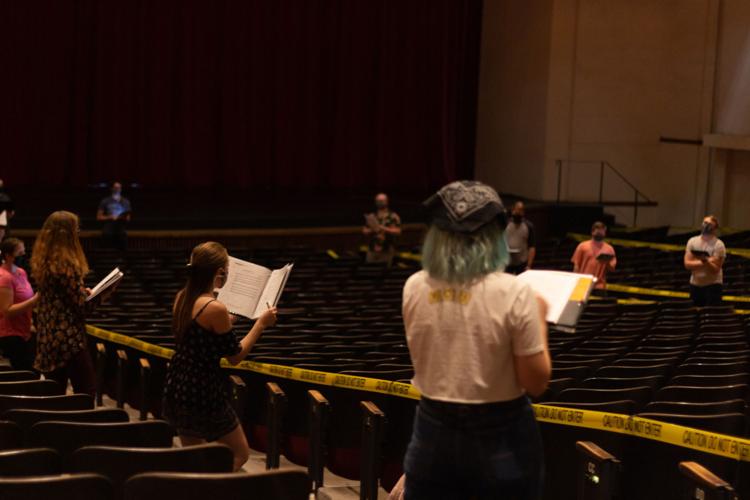The sounds of “Silent Night” echoed throughout the otherwise empty 2,500-seat Centennial Hall on Sept. 30 when almost all 36 members of the University of Arizona Symphonic Choir met in person.
They were wearing masks and standing 12 feet apart, finally reunited as an ensemble to rehearse the fan-favorite song from their annual “Holiday Card to Tucson” concert recital.
“It was kind of emotional, just because we don’t get to do our holiday concert,” chorister Lylah Field said. “That is the biggest concert we do every single year, but it’s more than just a concert. Family members come into town, we fill the entire St. Augustine Cathedral downtown, and it’s an amazing experience. So, it was cool to have that moment.”
For choirs during a worldwide pandemic, trying to sing in sync via Zoom is out of the question. As for singing in person, the options are both limited and complicated, but choir directors are getting creative. From the Grammy-nominated True Concord Voices & Orchestra to the University Community Chorus, vocal ensembles across Tucson are adapting to COVID-19 in myriad ways.
After spending an entire summer planning and experimenting, the UA Fred Fox School of Music choirs have come up with some interesting strategies.
The University Community Chorus, which is open to all, can have about 100 singers. Because that includes vulnerable populations, they are operating entirely online this semester. The rest, which are audition-only, use a flex model, where they meet both via Zoom and in person.
The UA undergrad Symphonic Choir is under the direction of music professor Elizabeth Schauer, who said the keys to her success this semester are to “be safe, be creative and adjust your expectations accordingly.”
“In some of our classes we might not be able to cover as much as we had before,” she said. “We want to make sure that everybody has a good educational experience and stays connected.”
When in person, the choirs practice for no more than 30 minutes in large indoor spaces, such as Centennial Hall. They maintain at least 12 feet in between them, always wear masks, and only meet three to four times a week. They rehearse in small groups of about eight singers, each assigned two graduate conductors. Those who are uncomfortable with practicing in person or who show any virus symptoms can participate online. The full ensemble will only meet as a group three to four times throughout the semester — two of those times in a covered parking garage.
“My approach with this is to always assume that it’s possible that someone among us has the virus,” Schauer said.
Field, 21, has been in the Symphonic Choir going on four years. She said that singing with a mask is difficult because it’s harder to breathe, to project and to open your jaw wide enough to make the correct vowel sounds. But the singer’s lungs seem to be adapting, even though it feels as if they are singing at a higher altitude, she said.
“Honestly, I feel like the choirs that come out of this COVID-era are going to be next level, because they’ll have lung stamina for days,” Field said.
Alyssa Cossey, the community choir director, created the University Community Chorus Virtual Webinar Series that meets at 6 p.m. on the second and fourth Tuesday of the month throughout the fall semester. The sessions are free and open to the public and include live, interactive events, singalongs and choral lectures both on Zoom and the UCC Facebook page.
Cossey wanted to start the webinars as a way to bring into conversation certain themes about inclusion and diversity in the choral field that aren’t usually accessible during a normal, time-crunched semester.
“In addition to the global pandemic, we are also dealing with this racial inequity that as a country we’re really trying to reckon with right now,” she said. “UCC’s slogan is: ‘Putting the community back in chorus,’ so this gives us a chance to examine music that we don’t normally do.”
For Field, it’s hard to juggle her passion for singing with the complications that could come with getting sick. The possible risk for her family, roommates and herself have to be weighed every day against both the opportunity and hazards of getting to do one large, in-person rehearsal.
COVID-19 has made Jordan Padilla, 19, that much more appreciative of singing in an ensemble.
“It’s a great joy to have people singing safely in person,” Schauer said.





